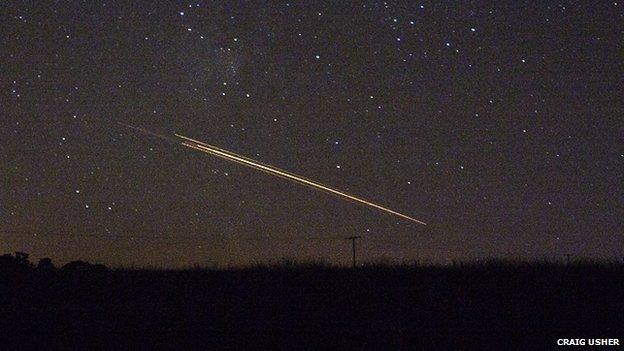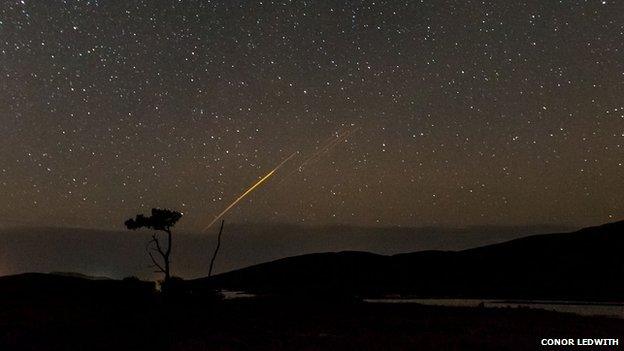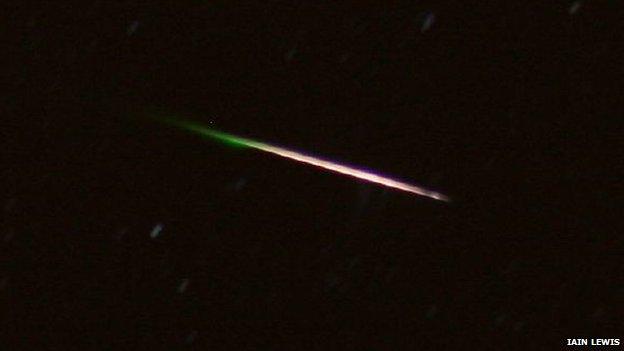'Meteors' sighted in skies across UK
- Published
People across the country report their sightings
People from across the UK have reported seeing bright objects in the night sky, thought to be meteors or "space junk"
Coastguards in Northern Ireland took calls from people who saw the objects from Coleraine on the north coast, to Strangford Lough in the south east.
The lights were seen as far north as Caithness in Scotland as well as in Wales and Norfolk in East Anglia.
Experts said the sightings could be satellite debris, burning up on entry to the atmosphere.
The lights have also been reported in the Midlands, parts of north-east England and in Glasgow and Edinburgh.
Brian Guthrie in Grangemouth near Edinburgh, who watched the objects pass through the sky, said it appeared to be something "pretty large breaking up in the atmosphere".
"I've seen shooting stars and meteor showers before, but this was much larger and much more colourful."

A flash of light caught the eye of Craig Usher, who snapped the object over Loch Thom in Greenock, Scotland.

Sightings of the meteor shower began at around 23:00 BST across the UK. Conor Ledwith was taking photos of the night sky when the 'fireball' streaked across the sky.

Iain Lewis accidentally photographed the meteor while taking pictures of the night sky in Chesterfield, Derbyshire.
Coastguards in the Shetland Islands received what they believe is Scotland's most northerly sighting of the meteor at 23:00 BST.
They were called by a member of the public who had seen a bright white light in the sky over the Stacks of Duncansby in Caithness.
'Yellow and orange ball'
One person who contacted the BBC said it was "kind of a mass of light, gold light. Everything moving in unison".
"It wasn't diverging... I thought it was a plane at first. It was quite low on the horizon and moving much slower than I'd expect to see a shooting star, but it was amazing."
Jodrell Bank's Tim O'Brien: 'Meteors' could be man-made space junk
Another said the sight was "like Independence Day" - a reference to the film about an alien invasion of Earth.
Diane Martin from Rainworth in Nottinghamshire said she saw "a bright yellow and orange ball" and considered calling the police before her husband checked the internet and found other people had seen it.
She told the BBC: "We only saw the one. It was quite low as well. It wasn't that far away to be honest. We thought something was actually going to come down in the actual village.
"It was travelling from east to west. It was coming down but it was going across more than it was going down."
Durham Constabulary said they were "inundated" with calls from members of the public across the north-east who were "concerned" as to the sightings of unidentified flying objects lighting up the night sky.
In Wales, sightings were reported between Cardiff and Swansea in the south, Aberystwyth in Ceredigion and Criccieth in Gwynedd.
Howard Parry spotted a "stream of light" while looking out to sea from his caravan in Llanrhystud in Ceredigion at around 23:00 BST.
"I thought first of all it was a plane going down then I thought what the devil is it?
"The best way I can explain it is that it looked like a train with all different carriages on it... it lasted about 25 to 30 seconds.
"I've never seen anything like it - it was really, really bright," he said.
Chris Butler, of Tonypandy in the Rhondda, said he saw "a triangle of orange lights" that "didn't look like a typical meteorite".
'Space debris'
He added: "It looked similar to aeroplane lights but it looked really huge so it obviously wasn't a plane or anything."
Dr Tim O'Brien, associate director of the Jodrell Bank Observatory, external, told the BBC it was difficult to know the cause of the phenomenon.
"It's hard to say exactly, whether it was a chunk of rock coming in from outer space, burning up in the atmosphere, or a bit of space debris we call it, space junk, which is basically man-made stuff from a spacecraft that's burning up in the atmosphere.
"[The object was] probably 80 miles up or so, high up, moving very fast, actually, 18,000 miles an hour, probably, at least."
Colin Johnston, from Armagh Planetarium, external in Northern Ireland, said the lights were unlikely to be part of a meteor shower.
"There are actually several small, faint, meteor showers scheduled across September but they're so unspectacular, not many people actually bother looking for them.
"I think that actually this spectacle tonight might not be associated with that."
"I think it's something just by chance has happened to come in tonight, some piece of actual space junk floating around the universe for billions of years has just picked tonight to fall in across our skies, or a satellite that's been up for some years has decided to burn up," he said.
- Published22 September 2012
- Published22 September 2012
- Published26 March 2012
- Published2 September 2011